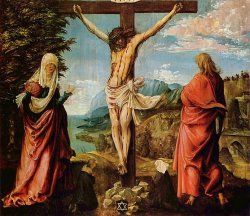Atheist's Attacks
Answering Humanist's Accusations Against the Bible


What Were Jesus' Last Words?

Did John get Jesus' last words wrong?
HUMANIST ACCUSATION: Regarding the last words of Jesus while on the cross, Matthew 27:46 and Mark 15:34 quote Jesus as crying with a loud voice, “My God, my God, why hast thou forsaken me?” Luke 23:46 gives his final words as, “Father, into thy hands I commend my spirit.” John 19:30 alleges the last words were, “It is finished.”
Who is right? Should we go with the majority opinion? Or could it be that the humanist who wrote this misunderstood what was written, and assumed something that is not in scripture. If you've been reading this from the beginning, you know what to do. Go to scripture. Find out whaty it actually says.
Matthew 27:46-50
About the ninth hour Jesus cried out with a loud voice, saying, “Eli, Eli, lama sabachthani?” that is, “My God, My God, why have You forsaken Me?” And some of those who were standing there, when they heard it, began saying, “This man is calling for Elijah.” Immediately one of them ran, and taking a sponge, he filled it with sour wine and put it on a reed, and gave Him a drink. But the rest of them said, “Let us see whether Elijah will come to save Him. ” And Jesus cried out again with a loud voice, and yielded up His spirit.
Apparently, the humanist who wrote this question did not read past verse 46. In Matthew 27:50, the last sentence in the above quote states: "Jesus cried out again." So "My God, my God, why have you forsaken me." were not his last words. He “cried out again” loudly after taking a drink of sour wine. However, Matthew does not record what He cried out. John 19:29b-30 does:
John 19:29b-30
...so they put a sponge full of the sour wine upon a branch of hyssop and brought it up to His mouth. Therefore when Jesus had received the sour wine, He said, “It is finished!” And He bowed His head and gave up His spirit.
When Jesus said, "It is finished!" what did that mean? It did not mean he had died. Jesus was stating, “mission accomplished!” This was not a last gasp before dying, but a shout of triumph! God's holy wrath against sin had been satisfied. Every prophecy had been fulfilled. Satan was defeated and rendered powerless. The work of redemption was accomplished. Everything that needed to be done was done… and nothing could be added to it. It was finished!
However, Jesus had not yet died. Next, He bows His head. John does not say whether Jesus says anything after that. However, that he bowed His head, instead of His head simply falling forward, shows the motion was intentional and Jesus was still alive.
John does not say whether Jesus said anything between when He bowed His head, and when He gave up His spirit. As I pointed out in the previous chapter, John’s focus was on the cross. Jesus’ work on the cross is finished, so there is nothing more for John to report. However, Jesus does speak again.
As we continue, please notice that Jesus voluntarily gave up His life at the moment He choose. He willingly went to the cross and He chose to give up His life only after His purpose for coming to earth had been accomplish.
John 10:17-18
For this reason the Father loves Me, because I lay down My life so that I may take it again. No one has taken it away from Me, but I lay it down on My own initiative. I have authority to lay it down, and I have authority to take it up again. This commandment I received from My Father.”
Luke is the one who records Jesus' final words. With His mis-sion accomplished, Jesus can now give up His physical life so that He can demonstrate there is life after death. While His mission of redemption was accomplished, He still needs to die physically so that three days later He can demonstrate that eternal life is real. Luke records:
Luke 23:46
And Jesus, crying out with a loud voice, said, “Father, into Your hands I commit My spirit.” Having said this, He breathed His last.
After saying these last words, Jesus gives up His physical life. On the third day He will demonstrate to the world there truly is life after death. No one ever came off a Roman cross alive (physically). That was true of Jesus. There was no doubt He was dead. Howev-er, physical death is not the end.
What did we find out here? There is no contradiction.
Next accusation...
There are even contradictions in the accounts of the resurrection – the supposed event that is the very foundation of the Christian religion.
Really? The humanists will need to make some strong arguments on this one. Click here to find out what they say... and what the answers are. You'll learn the strong proof that the resurrection was real. It is a real historical fact with better evidence supporting it than any other ancient event.
SORRY,
I NEVER KNEW YOU

Many people, when they die, will stand before Jesus and say:
Lord, Lord, did we not prophesy in Your name, and in Your name cast out demons, and in Your name perform many miracles? - Matthew 7:22
And Jesus will say to them:
I never knew you; depart from Me, you who practice lawlessness. - Matthew 7:23
Get your Bible out and read Matthew 7:21-23. These are some of the most frightening verses in the Bible.
They describe people who believe with all their heart that they are saved. They have no doubt that they know Jesus and they've done many great things that prove this is true. Put Jesus says, 'Depart from me...' He doesn't know them.
Are you truly trusting Jesus? Scripture says to examine yourself to see if you are in the faith (2 Corinthians 13:5). Have you done that?
Do you read your Bible regularly? Do you fear false teaching? Are you growing in your obedience to God? Are you growing in your understanding of what God wants? Do you regularly share the good news about Jesus with others?
